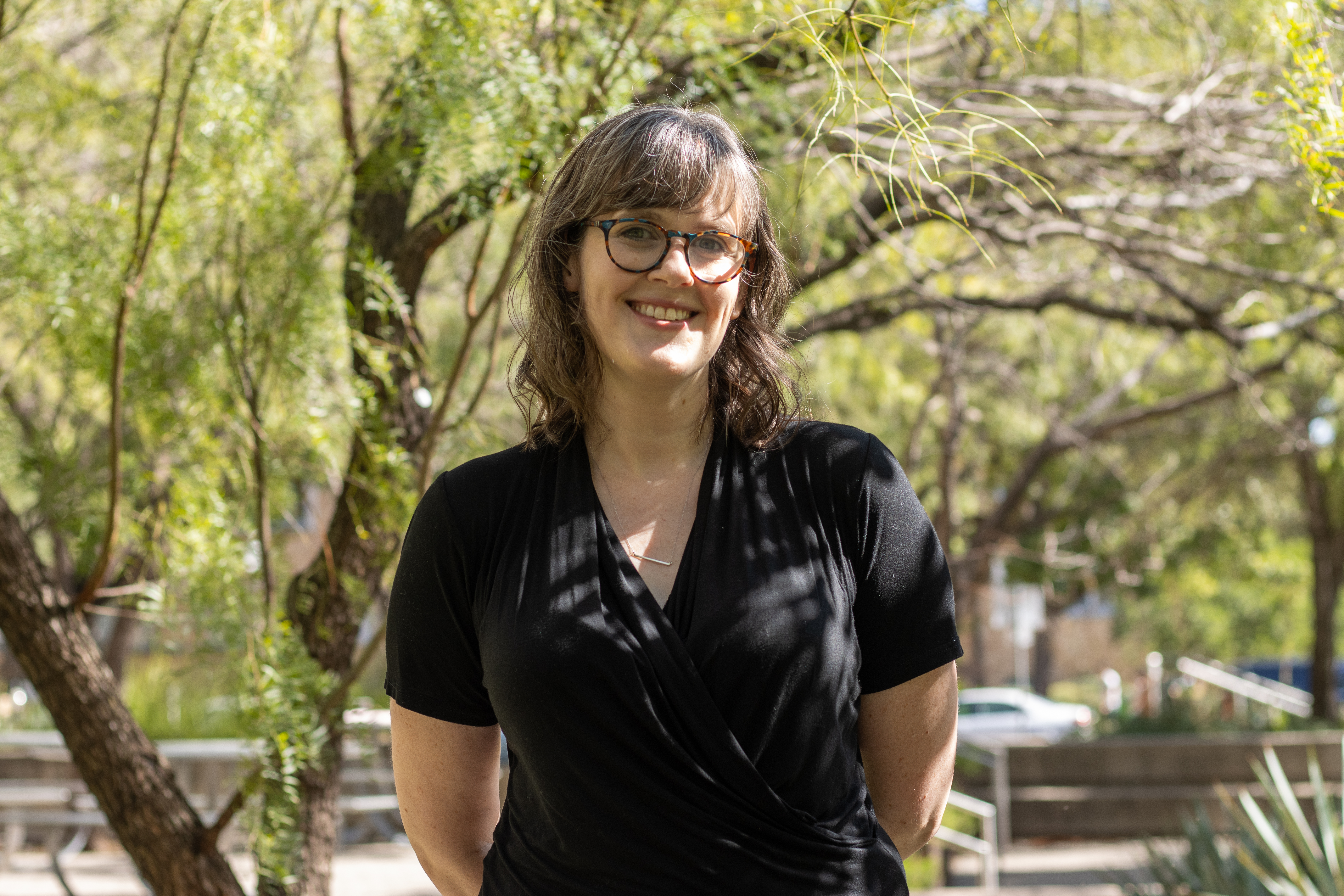Revealing Parkinson’s impact

Parkinson’s disease is a progressive, neurodegenerative illness that is often considered a movement disorder characterized by tremors, rigid muscles and impaired posture and balance. However, perhaps less well known, it also impacts sensory and cognitive processes and causes numerous other issues such as swallowing disorders, when patients lose control of their throat muscles. This can cause people who have Parkinson’s to not be able to eat and drink certain things or to consume as much as they want, leading to malnutrition and dehydration.
Corinne Jones, an assistant professor in the Department of Speech, Language, and Hearing Sciences at Moody College of Communication, has been studying and pioneering the connection between Parkinson’s and swallowing disorders for years.
One of Jones’ goals is to track the disease’s progress earlier, to see how swallowing functions change over time, with the goal of developing and testing preventative treatment. She wants patients to be able to maintain their swallowing functions for longer.
Since Parkinson’s is a neurodegenerative condition, people don’t just wake up one day unable to swallow, Jones said.
“These things can change really subtly,” she said. “Since it’s a progressive disease, by the time people do experience these complaints, it can be hard as a clinician or as a therapist to rehabilitate because they’re further along in the disease process.”
For her dissertation at the University of Wisconsin-Madison, Jones used a small tube with sensors that goes through a patient’s nose and down their throat to measure the pressure that swallowing exerts. Historically, researchers have used X-rays to see the way foods and liquids move through the throat, which showed no real difference between a healthy person and someone with Parkinson’s. Jones’ research using pressure measurements showed that there are, in fact, minute differences early on.
Her dissertation, along with her work since coming to The University of Texas at Austin, recently has earned her the American Speech-Language-Hearing Association’s Early Career Contributions in Research Award.
“Dr. Jones uses state-of-the-art technological approaches to evaluating swallowing and is working to design innovative treatments to help the many people who suffer from disordered swallowing,” said Maya Henry, an associate professor in the Department of Speech, Language, and Hearing Sciences and director of the Aphasia Research and Treatment Lab. “The quality and impact of her work are underscored by her recent and very prestigious award.”
Jones’ mentor at UW-Madison, Michelle Ciucci, received the same award before her, and Jones said it was inspiring to see Ciucci blaze a trail in the field. Her mentor went on to nominate Jones for the award.
“I am definitely someone who suffers from imposter syndrome,” Jones said. “So having this recognition is just more evidence that I am on the right path and that I’m working for something meaningful.”
Jones’ first introduction to swallowing disorders was in her master’s program, when a class that focused more specifically on swallowing disorders sparked her interest immediately.
“I’m a really visual person, so looking at these X-rays and seeing where the breakdown is in swallowing made a lot of sense to me,” Jones said. “In the master’s program, we had externships where we would go and practice being clinicians with supervision, and seeing those patients and being able to give them answers about their eating and drinking was really rewarding to me.”
Jones came to UT Austin in 2018 after David Paydarfar, the chair of Dell Medical School’s Department of Neurology, asked her to bring her research to the University. When she started at Moody College, the Department of Speech, Language, and Hearing Sciences did not have a swallowing expert on staff. Jones started the Swallow Modulation Lab, a collaboration between Moody College and Dell Medical.
The lab uses pressure measurements — the kind Jones began experimenting with in her master’s program — and artificial intelligence tools to better understand the pressure data and how different neurodegenerative processes impact swallowing functions.
“Our goal is to develop novel ways that we can address swallowing in different neurodegenerative conditions,” Jones said. “We have a measurement piece and then how diseases impact or modulate swallowing, but then we also study how we can act to change how we swallow and improve our rehabilitation options.”
Studying swallowing is in the medical niche of speech-language pathology, Jones said, so a partnership with a medical center is necessary to access equipment such as X-rays. However, the Department of Speech, Language, and Hearing Sciences’ place within a communication college is unique and helps facilitate aspects of her work.
“I think being in Moody and having the creativity of all the other communications majors has helped me take a slightly different look at the more human aspects of the field,” Jones said. “It’s helping me figure out ways to increase advocacy through education.”
As Jones moves further into her career, she’s enjoyed seeing her former students as clinicians and being able to mentor her own doctorate students. Going forward, she is excited to continue her work at UT and see its impact as it is put into practice.
“I always try to bring it back to the patient because all of what I do is to try to help improve the lives of people with swallowing problems,” Jones said. “That makes it really nice to come to work every day because I have that kind of mission. That’s where I’m directing most of my efforts toward.”
